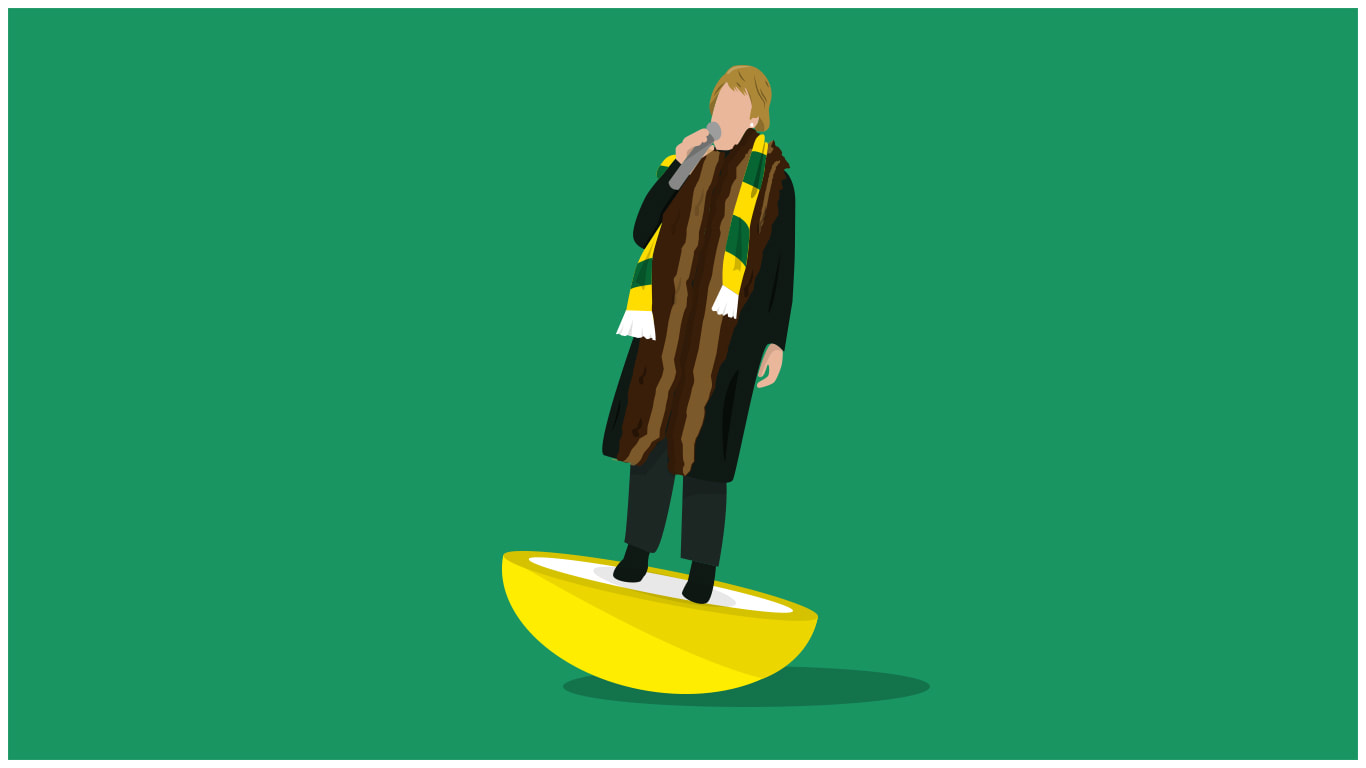Larn Yerself Narrich
Mark Lawn returns with a guide for foreigners (anyone south of Diss or west of Lynn) a gorn to Carra Rud on a Satdee (or a Tewsday)

I was born in Norwich and have lived here all my life, and I sound like it an’ all.
As my young season ticket holding grandsons like to say, “there is a “t” sound in that word” and “you sound like a farmer”. Theere got a nurv and shud no bearter.
So, to help all young Canaries and visiting fans, here’s a guide to speaking proper.
First the history: Norwich is distinct from its county sibling of Norfolk, being harsher, faster and with a tendency to run words together, as in “owdidsitygiton?”
The dialect is largely Anglo-Saxon based with input from the Vikings, Danish, Norman and German invaders; together with Dutch and Waloon weavers and protestant and Huguenot refugees.
Norwich is also distinct in its pronunciation from other southern English accents. The letter “H” is rarely dropped; the “y” sound in words like “few” are not sounded so it becomes “foo”. Stressed vowels are lengthened “Norwich” becoming “Naahritch” and the suffix “ing” pronounced “en” so “playing” becomes “playen”. Meanwhile, vowel sounds are run together, so “going” becomes “gorn”.
Grammar is also different in Norfolk. We have (probably from the Walloons) the wonderful third person singular of the verb “to go”, which as the Nimmo Twins have made famous becomes “she go” rather than “she goes” and “I’m not” invariably becomes “I int”. “It” is often replaced by “that”.
The past tense is also different. “Showed” becomes “shew”; “drive” becomes “driv”; “frozen” becomes “froze” and so on.
Plurals are rarely used and many verbs have no past tense at all for example come, give and go i.e. “He come round mine”, “gi me the pink’un” and “that was a good un”.
The word “do” is a brilliantly versatile all-purpose word in Norfolk. For instance, the phrase “do he do as he do do, do you let me know” meaning “if he does as he normally does, please inform me as such”.
Other good words include “squit”, meaning rubbish (allegedly originally used to describe dogs diarrhea) and the highest form of praise “arwrite” originally used for beating town “that was arwrite”, or Teemu Pukki scoring 29 goals in a season “he dun arwrite dint ee”.
Useful Phrases
- “Aas wahee say” = That is what he says
- “Hair he cum” = Here he is
- “Hesay” or “he go” = He says
- “Heeryer sinem?” = Have you seen that man?
- “Hewsaiso?” = Who says that
- “Howyagittinon?” = How are you getting on?
- “Jasnow” = A moment ago
- “Jasup terrud” = It is nearby
- “Hass a nurn” = I’ve not heard that before
- “No that hint” = It is not
- “Shuwai?” = Shall we?
- “Thass brook” = It is broken
- “Thass a rumman” = That is a puzzle
- “Eyeltellhym” = I’ll let him know
- “Um goorn um” = I’m going home
- “Umon olidy” = I’m on holiday
- “Yewr gorn agit wrong” = If you persist, you will be in trouble
- “Yew kin cum rondmyn if you wat” = You’re welcome to come to my house
Finally… most away fans have limited time in the Citee and Carra Rud is close to the station, however if time allows a visit to the Carsellmewseam is well worth it, with a fine view of the maakett place and citee asahull. You might even catch a glimpse of the Lormar Kenny Mclean
Enjoy your visit buhs and gals.
Bologna Nodge badge - *SALE PRICE*
Napoli Nodge Badge *SALE PRICE*
THE NODGE FACE BADGES - *SALE PRICE*
Comments
New Season, New Hope
14/08/19
Terri Westgate joins us to build-up to the first home game of a new season. We all know the feeling; hope.
Newcastle (h); The Preview
16/08/19
Andrew Lawn is joined by George Caulkin, who after 21 years covering Newcastle for The Times is joining The Athletic, to look ahead to City's Carrow Road return

That int arf bad, bor. Keep yew a troshin
We do speak simlar in Suffolk!
Gorblast boy you hit the nail there
Hev enyonya got a lite on ya enyonya
Arter twetty odd yair livin abrord thass gud ter noo thairs sumwun tekkin cair of learnin furrriners about naarge